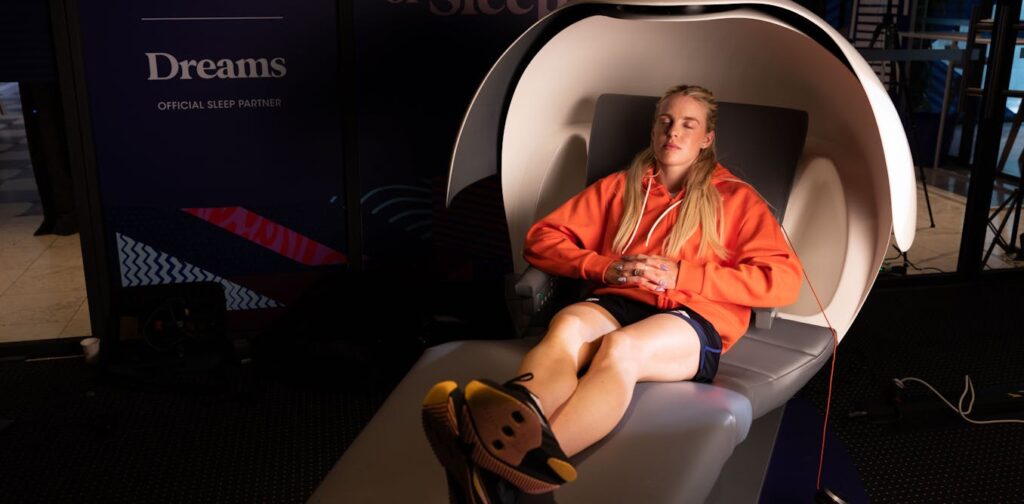
When we envision elite athletes, we often picture individuals at the pinnacle of physical prowess, excelling in every aspect of their sport. Yet, a crucial element of their performance, often overlooked, is sleep. Does being an extraordinary athlete equate to being an exceptional sleeper? Surprisingly, the answer is not as straightforward as one might think.
Exercise is commonly linked to improved sleep quality, leading to the assumption that elite athletes, whose careers revolve around physical activity and recovery, naturally enjoy better sleep. However, recent studies reveal a different story. In a 2021 survey of 175 elite Australian athletes across 12 sports, only 3% consistently achieved adequate sleep, while a staggering 71% regularly fell short by an hour or more. This trend is consistent with research involving athletes from the United States, Brazil, Germany, Switzerland, and China.
The Challenges of Sleep for Athletes
So, why is sleep such a formidable challenge for elite athletes? The primary adversary is often their demanding training and competition schedules. For individual sport athletes like swimmers, triathletes, and cyclists, early morning training sessions and limited rest days pose significant obstacles. Meanwhile, team sport athletes such as Australian rules footballers and netballers face fluctuating schedules and travel demands that disrupt sleep patterns. Additionally, pre-competition anxiety can further hinder their ability to secure sufficient rest.
The importance of sleep in athletic performance cannot be overstated. A recent consensus among sleep and sports scientists globally underscores its critical role. Even renowned athletes like Usain Bolt, LeBron James, and Roger Federer acknowledge sleep as a vital component of their success.
Sleep, Health, and Injury Risks
Research indicates that elite athletes can perform at or near peak levels after a single night of insufficient sleep. However, the real test lies in maintaining performance over consecutive days of inadequate rest, a question that remains largely unanswered. Moreover, sleep deprivation poses significant health risks. Individuals obtaining only 5-6 hours of sleep per night are 4.5 times more likely to develop a common cold when exposed to rhinovirus compared to those who sleep seven hours nightly. Thus, insufficient sleep increases the likelihood of illness among elite athletes.
The link between sleep and injury risk in elite sports is less definitive, but inadequate sleep is known to slow response times, impair movement patterns, and diminish sport-specific skills, all of which can lead to injury. Perhaps the most pressing concern for athletes is the impact of sleep deprivation on their mental and physical state. Multiple nights of insufficient sleep result in increased fatigue, perceived exertion, and mood disturbances, all of which can hinder training and recovery.
Strategies for Better Sleep
At the elite level, marginal gains can determine whether an athlete finishes on the podium or falls behind. The Tour de France, renowned as one of the most grueling endurance races, exemplifies this. Many teams now optimize riders’ sleeping conditions with “recovery buses” and personalized hotel accommodations. Despite the race’s demands, riders average a reasonable 7.2 hours of sleep per night.
However, not all athletes have access to such resources. Here are some strategies that athletes and coaches can consider to enhance sleep quality:
- Consistent Sleep Schedule: Encourage a regular sleep routine, even on rest days, to regulate the body’s internal clock.
- Optimized Sleep Environment: Create a comfortable and dark sleeping environment, minimizing noise and distractions.
- Pre-Sleep Routine: Develop a calming pre-sleep routine to signal the body that it’s time to wind down.
- Mindfulness and Relaxation: Incorporate mindfulness practices or relaxation techniques to alleviate pre-competition anxiety.
- Limit Screen Time: Reduce exposure to screens and electronic devices before bedtime to improve sleep quality.
Looking Ahead
As the understanding of sleep’s impact on athletic performance deepens, it becomes increasingly clear that optimizing sleep is not just beneficial but essential for elite athletes. The pursuit of excellence requires not only physical and mental prowess but also the foundation of adequate rest and recovery. As more athletes and coaches recognize this, sleep may well become the next frontier in performance enhancement.
In conclusion, while elite athletes continue to push the boundaries of human capability, ensuring they get enough sleep could be the key to unlocking even greater potential. As research progresses, the sports community will likely place greater emphasis on sleep as a critical component of training and recovery strategies.







